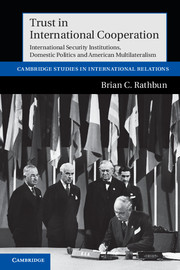 Trust in International Cooperation
Trust in International Cooperation Book contents
- Frontmatter
- Contents
- Preface
- 1 Circles of trust: reciprocity, community and multilateralism
- 2 Anarchical social capital: a social psychological theory of trust, international cooperation and institutional design
- 3 The open circle: the failure of the League of Nations
- 4 Squaring the circle: the birth of the United Nations
- 5 Closing the circle: the negotiation of the North Atlantic Treaty
- 6 Coming full circle: fear, terrorism and the future of American multilateralism
- Works cited
- Index
1 - Circles of trust: reciprocity, community and multilateralism
Published online by Cambridge University Press: 05 June 2012
- Frontmatter
- Contents
- Preface
- 1 Circles of trust: reciprocity, community and multilateralism
- 2 Anarchical social capital: a social psychological theory of trust, international cooperation and institutional design
- 3 The open circle: the failure of the League of Nations
- 4 Squaring the circle: the birth of the United Nations
- 5 Closing the circle: the negotiation of the North Atlantic Treaty
- 6 Coming full circle: fear, terrorism and the future of American multilateralism
- Works cited
- Index
Summary
In 2001, even before the terrible events of 9/11, a term once reserved for arcane discussions among academics began to seep into the public discourse – unilateralism. This was the characterization of a number of high-profile actions taken by the new Republican administration such as the “unsigning” of the International Criminal Court statute and a lack of serious engagement on the issue of climate change. Following the terrorist attacks in New York and Washington, the Bush administration decided to fight the war in Afghanistan largely alone, refusing an offer of NATO help. Then, of course, came Iraq. The American government, unable to garner the international community's endorsement of its aim of permanently disarming Saddam Hussein's regime by force, proceeded without the sanction of the United Nations. The government's unilateralism, it has been consistently maintained, marked a departure from the post-WWII tradition of American multilateral engagement and has attracted widespread disappointment and scorn on the part of American allies.
Even as the Bush administration was castigated for being unilateral, however, scholars and pundits alike failed to interrogate the term and its logical opposite – multilateralism. What are unilateralism and multilateralism and what are their sources? A convenient answer is that unilateralism is the desire to go it alone, one that simply emerges when a state's interests are out of line with those of other countries. Why, after all, would the United States seek to constrain itself multilaterally in the United Nations when other countries were not as threatened by the possibility of weapons of mass destruction falling into terrorists’ hands?
- Type
- Chapter
- Information
- Trust in International CooperationInternational Security Institutions, Domestic Politics and American Multilateralism, pp. 1 - 23Publisher: Cambridge University PressPrint publication year: 2011
